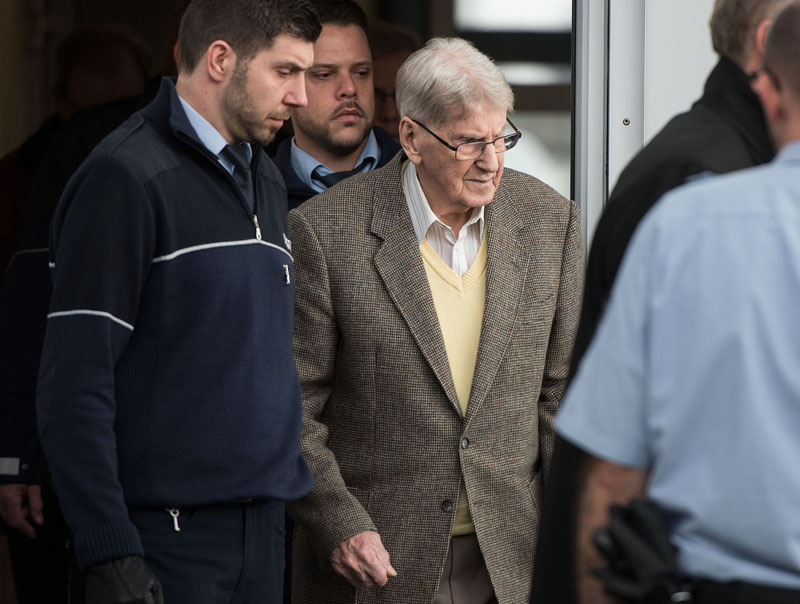Former Auschwitz guard, 94, goes on trial in Germany
DETMOLD: A 94-year-old former SS sergeant went on trial Thursday in western Germany on 170,000 counts of accessory to murder, based on accusations that he served as a guard in the Auschwitz death camp as hundreds of thousands of Hungarian Jews and others were gassed to death there.
Reinhold Hanning seemed in good condition for his age, walking into the court in the city of Detmold without even the help of a cane and appearing to listen attentively as the indictment against him was read aloud.
No pleas are entered in the German system. Hanning, who ran a local dairy after the war until he retired in 1984, declined to give an opening statement to the court.
He showed no reaction as the first witness, Leon Schwarzbaum, a 94-year-old Auschwitz survivor, read moving testimony about his own experiences, then looked directly at Hanning and made an emotional plea.
"Mr. Hanning, we are about the same age and we will both soon be before the highest court," Schwarzbaum said, his voice quavering and hands trembling. "Speak here about what you and your comrades did!"
The trial is one of four expected this year against two other former SS men and one woman alleged to have served in Auschwitz. The 11th-hour prosecutions come after a new precedent was set in 2011, when former Ohio autoworker John Demjanjuk became the first person to be convicted in Germany solely for serving as a death camp guard, with no evidence of involvement in a specific killing.
Prosecutors successfully argued in the Demjanjuk case that simply serving in a death camp, and thus helping it operate, was enough to convict someone of accessory to the murders committed there. Although Demjanjuk always denied serving at the death camp and died before his appeal could be heard, prosecutors last year successfully convicted SS sergeant Oskar Groening, who served in Auschwitz, on 300,000 counts of accessory to murder using the same reasoning.
Hanning admitted to investigators when first questioned that he had served in the Auschwitz I part of the camp in Nazi-occupied Poland, but denied serving at the Auschwitz II-Birkenau section, where most of the 1.1 million victims were killed.
As the trial opened, however, his attorneys filed a motion asking to exclude that statement, saying that Hanning had been "surprised" when authorities showed up at his house and wasn't fully aware he was under investigation. It wasn't clear when the judges would rule on the motion. His attorney, Andreas Scharmer, would not say whether the defense was planning to try and argue that Hanning did not serve in the camp at all if his statement was excluded.
Prosecutor Andreas Brendel told The Associated Press after the hearing that there was also other evidence that Hanning was there, including SS company lists.
Reading the indictment, Brendel told the court that Hanning served in two different SS Death's Head companies in Auschwitz as a guard. He said those companies were used to guard prisoners used as slave laborers outside the camp, and also were called to Birkenau to help with the tens of thousands being brought in during the so-called "Hungarian action" in 1944 and unloaded from trains onto a ramp.
On the ramp, Nazis stripped the prisoners of their possessions and sorted them into groups: those who would be immediately taken to the gas chambers and those fit enough to be used as slave labor, and likely worked to death.
"The decision over life and death lay with the SS men on the ramp," Brendel said.
Doctors have advised that the trial sessions can run no longer than two hours, in deference to Hanning's age and health.
Schwarzbaum, one of about 40 Auschwitz survivors or their relatives who have joined the trial as co-plaintiffs as allowed under German law, had his testimony cut short before he could finish answering questions. He's due to take the stand again when the trial resumes Friday.
After the proceedings, he told the AP his main hope for the trial is that Hanning will tell his story so the world will better know what happened in Auschwitz and why SS guards did what they did.






